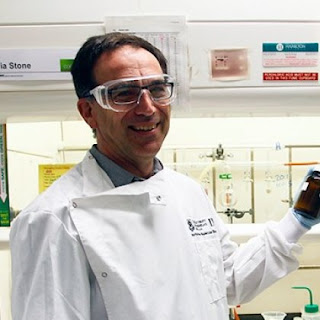 |
| Associate Professor Mark Blaskovich |
The database and virtual laboratory, called SPARK, aims to foster the development of new antibiotics to prevent projections of 10 million deaths globally per year from superbugs by 2050.
SPARK– the Shared Platform for Antibiotic Research and Knowledge – enables scientists to share data and insights, learn from past research and generate new knowledge into how to kill bacteria.
Associate Professor Mark Blaskovich said superbugs threatened to make common medical procedures such as joint replacements, liver transplants and chemotherapy too dangerous because of the risk of untreatable infection.
“Without new antibiotics, the world risks a return to the day when a simple schoolyard scrape could lead to a deadly infection,” Dr Blaskovich said.
Superbugs have evolved to develop resistance, with mechanisms that protect them from the effects of a range of antibiotics.
“Many pharmaceutical companies have left the field of antibiotic research and development because of low returns on investment,” Dr Blaskovich said.
“This is where SPARK comes in, filling the gap and helping the global community come together to discover effective new antibiotics.
“SPARK captures the collective wisdom of companies and researchers that have retired from antibiotic discovery and provides a one-stop shop to find a wealth of antibiotic-related data that would otherwise be difficult to access.”
SPARK gathers data from a range of sources, including discontinued research from pharmaceutical companies and current antimicrobial testing results from academic researchers.
It is a freely accessible database, with more than 800 users in more than 60 countries using SPARK in its first three years to learn from past successes and failures.
It has information about almost 160,000 compounds and associated data from scientific journals, individual users and companies including Merck, Kyorin, Achaogen and Novartis.
SPARK was created and operated by The Pew Charitable Trusts to spur the discovery of novel antibiotics.
The initiative was transferred to the Community for Open Antimicrobial Drug Discovery (CO-ADD) at UQ’s Institute for Molecular Bioscience in 2021 to continue its development and operation.
“The enthusiasm and engagement we’ve seen from SPARK users since the platform’s launch in 2018 underscores the strong desire for more collaborative data and information sharing,” said David Hyun, who directs Pew’s antibiotic resistance project.
“We’re excited about SPARK’s future at CO-ADD, where the platform will continue to be available to the global scientific community, and hope that it continues to help build momentum in the search for urgently needed new antibiotics.”
CO-ADD provides free screening of chemical compounds from academic research collaborators – and a database of biological data – to invigorate the discovery of antibiotics.
“With the integration of SPARK, we will be able to use CO-ADD to provide a broader and more comprehensive knowledge base for the global research community,” Dr Blaskovich said.
More than 300,000 compounds have already been tested, with CO-ADD identifying 2500 that have suitable properties for further investigation.
Dr Blaskovich said the capabilities of SPARK would complement those of CO-ADD – and the team planned to include additional data and functions, such as the ability for researchers to test artificial intelligence and machine learning tools.
“We see SPARK has vital in preserving the treasure trove of scientific knowledge that might otherwise be lost – and represents our best chance at countering the dire and growing public health threat that is antibiotic resistance,” he said.
Source/Credit: University of Queensland
scn112121_01







.jpg)